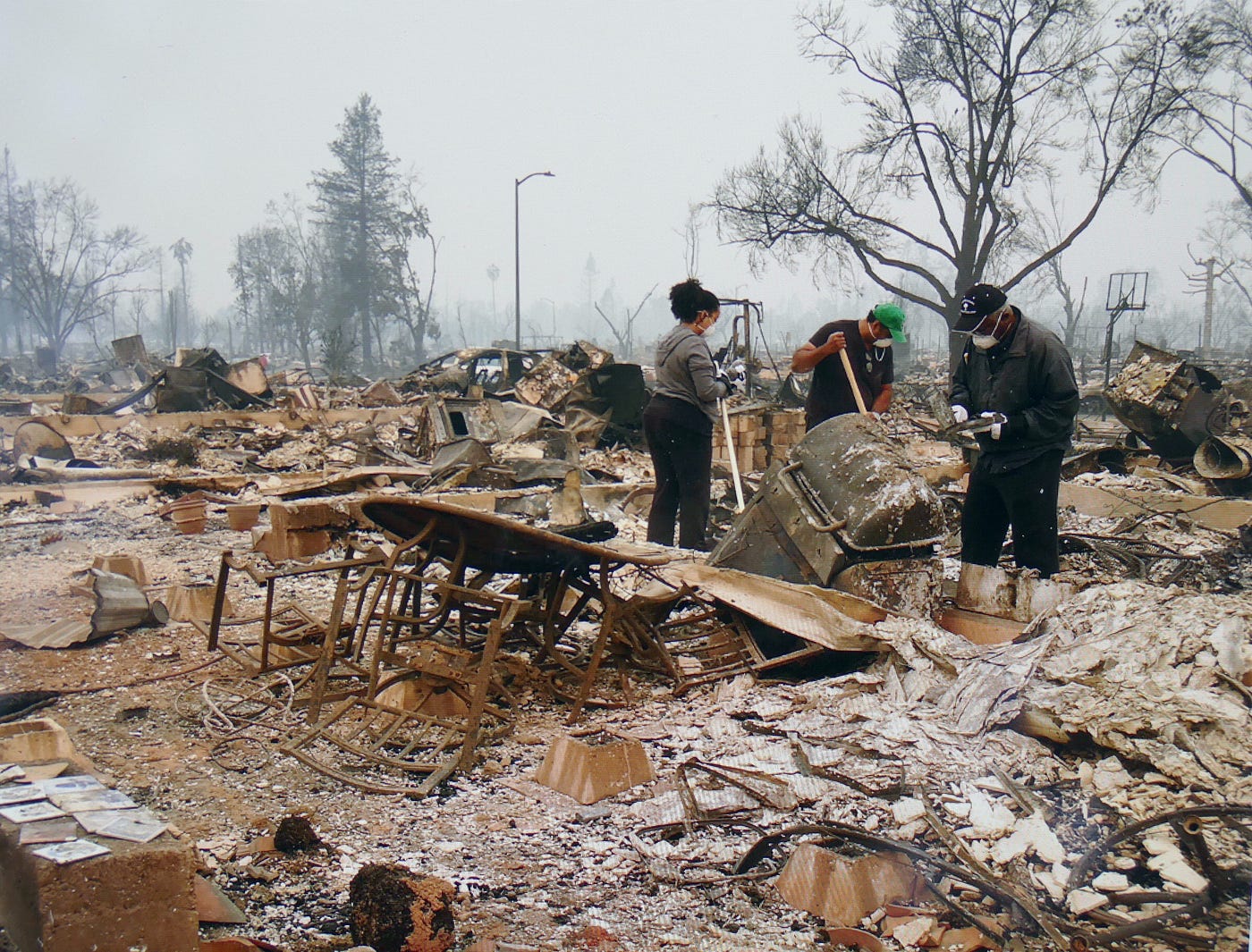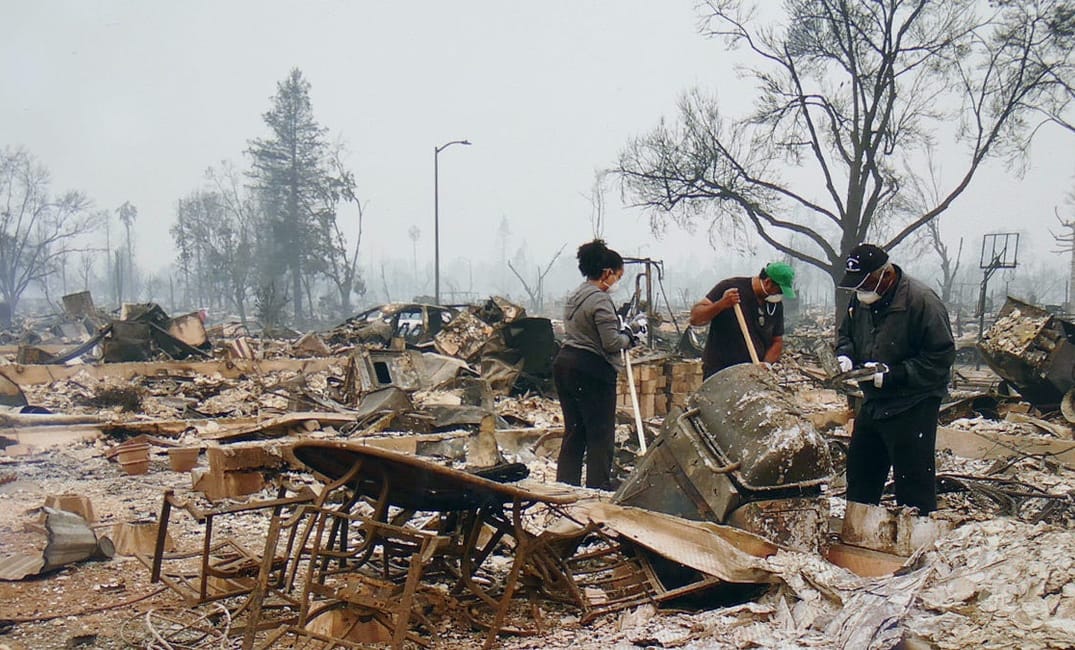
I grew up in the little mountain community of Berry Creek, California. It’s been devastated by the wildfires. The homes of nearly all 2,000 residents, most of whom lived there for decades, intentionally keeping a less modern way of life, were turned to piles of ash.
I’m struggling with this devastation, even though I’m far removed from the place and way of life from my childhood. I haven’t lived there in many years; I was glad to leave. However, much of my family and nearly everyone I grew up with either still live there or are deeply connected to those who still do. The homes that are gone are the same homes from our childhood, homes that were greatly unchanged and owned by people who had no intention of ever leaving their beautiful tall-pine forest. It’s an unparalleled loss.
The scene of debris is recurring across the West Coast of the United States, where massive fires, raging for many weeks and showing little mercy, have burned millions of acres, through rural towns and outlying neighborhoods of bigger cities. Soon though, people will be allowed back in to examine the scorched remains of everything that was so familiar, and it will be mostly unrecognizable.
Sign up for The Bold Italic newsletter to get the best of the Bay Area in your inbox every week.
We learned some things in 2018, when my girlfriend’s home was lost in the Camp Fire, which claimed the entire town of Paradise, California. At the time, I reached out for advice from an archaeologist who had lost his own home to a fire a few years prior. He gave me a lot that can help when you decide to look for your recoverables.
It feels like an impossible task when you stand in front of it for the first time. Between the overwhelming feelings that flood in and the confusing reality of how 10- or 20-foot-tall buildings full of things can become literally flat, it’s hard to remember the short list of things, like jewelry or a safe or the remains of a lost pet, that you came in hoping to find. I hope these tips will help.
1. Nothing will be where you think it will be
When walls collapse, everything is pushed toward the center of the room. So, rather than trying to remember where things were, try to find any clue that you recognize and imagine what else was around that. If you’re looking for a jewelry box that was near a window, you won’t find it at the edge of things; you’ll find it a few feet away, under a jumbled mess of melted window-frame remnants.
2. Wear rubber boots, work gloves, and sturdy jeans
Soot is oily and will get into the fibers of your clothes and likely will not come out. Use N95 masks, not just a face covering. This is dangerous work amid fire-affected metal and glass. Everything you touch will be toxic.
3. Bring several buckets and a good sifting tray, if you can get your hands on one
Any other tools you might want at an excavation site will be helpful: shovels, water, bristle brushes, etc. Also, metal detectors aren’t as helpful as you might think, because there will be so much metal everywhere.
4. Try to treat it like a true archaeological excavation
Make a plan, and imagine the area in a grid. Be methodical about exploring one space at a time, move in the same direction, and move the materials out of the space. This is especially important if you’re searching specifically for items like jewelry.
5. Start early in the day, and give yourself plenty of time
Consider dedicating a few days. This is emotionally exhausting labor, and it’s a much bigger project than you think. You might also want some time to recover before returning to work.
6. This is maybe the most important: Go in with zero expectations
People will apply logic about how your jewelry will definitely be fine. But gold and silver melt at high temperatures, and trust me, it was that hot. You might get lucky. But don’t count on it, and don’t get your hopes up based on nice things people who haven’t done this work might say. Zero expectations and a few deep breaths. It’s going to be rough.
7. You will be surprised by what survives a fire
You’ll fall in love with weird melted wine glasses, and you’ll find that ceramics do pretty well (because they are literally fired during their creation). We found metal butterflies from garden art stakes and a pile of glass “rocks” from my girlfriend’s fish tank that had been fused together in a mound. These things are incorporated into our current garden. We love having these small, strange-looking oddities to remember what was.
8. Whatever things you find to carry into the next chapter of your life will certainly become treasures. (But remember: They are still toxic.)
Prepare yourself for the continued deterioration of whatever you collect. These items have been fired and oxidized, and that does a lot of damage. They will quickly become brittle. Some things will literally crumble into dust in a year or two or break during a small shift while you’re dusting.
9. It’s going to hurt. A lot.
Maybe they are just “things,” but they were your things, and they were the backdrop for your corner of this world. Allow yourself time to grieve, and don’t bring anyone with you who doesn’t make you feel fully supported in this tragedy.
10. It’s okay to not do any of this
If you have no desire to go back and sift through your destroyed possessions, that is okay. Respect your desire not to compound your pain. Even if you thought you could handle it. Even if everyone says you should try. Do what’s best for you.
Sending all my love and hope to everyone going through this awful experience.







